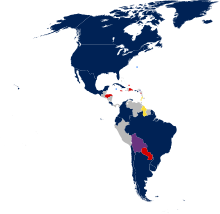LGBTQ rights in the Americas | |
|---|---|
 Status of same-sex marriage and other types of same-sex partnerships in the Americas.
Same-sex marriage1
Other type of registered partnership1
Limited domestic recognition1
Foreign marriages recognized for residency only
Unrecognized
Constitution restricts marriage to opposite-sex couples
Unenforced ban on same-sex sexual activity
1May include recent laws or court decisions which have created legal recognition of same-sex relationships, but which have not entered into effect yet. | |
| Status | Legal in 30 out of 35 states; equal age of consent in 26 out of 35 states Legal in all 21 territories; equal age of consent in 16 out of 21 territories |
| Gender identity | Legal in 13 out of 35 states Legal in 8 out of 21 territories |
| Military | Allowed to serve openly in 14 out of 29 states that have an army Allowed in all 21 territories |
| Discrimination protections | Protected in 22 out of 35 states Protected in 14 out of 21 territories |
| Family rights | |
| Recognition of relationships | Recognized in 11 out of 35 states Recognized in 18 out of 21 territories |
| Restrictions | Same-sex marriage constitutionally banned in 7 out of 35 states |
| Adoption | Legal in 7 out of 35 states Legal in 13 out of 21 territories |
Laws governing lesbian, gay, bisexual, transgender and queer (LGBTQ) rights are complex and diverse in the Americas, and acceptance of LGBTQ persons varies widely.
Same-sex marriages are currently legal in Argentina, Brazil, Canada, Chile, Colombia, Costa Rica, Cuba, Ecuador, Mexico, United States and Uruguay. Free unions that are equivalent to marriage have begun to be recognized in Bolivia. Among non-independent states, same-sex marriage is also legal in Greenland, the British Overseas Territories of the Falkland Islands and South Georgia and the South Sandwich Islands, all French territories (Guadeloupe, Martinique, Saint Barthélemy, French Guiana, Saint Martin, and Saint Pierre and Miquelon), and in the Caribbean Netherlands, Aruba, and Curaçao, while marriages performed in the Netherlands are recognised in Sint Maarten. More than 800 million people live in nations or sub-national entities in the Americas where same-sex marriages are available.
On 9 January 2018, the Inter-American Court of Human Rights issued an advisory opinion that states party to the American Convention on Human Rights should grant same-sex couples accession to all existing domestic legal systems of family registration, including marriage, along with all rights that derive from marriage.[1] The Supreme Courts of Honduras,[2] Panama,[3] Peru[4] and Suriname[5] have rejected the IACHR advisory opinion, while the Supreme Courts of Costa Rica and Ecuador adhered to it. Argentina, Brazil, Colombia, and Uruguay are also under the court's jurisdiction, but already had same-sex marriage before the ruling was handed down.
However, five other nations still have unenforced criminal penalties for "buggery" on their statute books.[6] These are Grenada, Guyana, Jamaica, Saint Lucia, and Saint Vincent and the Grenadines, of which Guyana is on mainland South America, while the rest are Caribbean islands. They are all former parts of the British West Indies. In addition, in Anguilla, the Bahamas, the Cayman Islands, Paraguay, Montserrat, Suriname and the Turks and Caicos Islands, the age of consent is higher for same-sex sexual relations than for opposite-sex ones, and in Bermuda, the age of consent for anal sex is higher than that for other types of sexual activities.
- ^ Malta, Monica; Cardoso, Reynaldo; Montenegro, Luiz; De Jesus, Jaqueline Gomes; Seixas, Michele; Benevides, Bruna; Das Dores Silva, Maria; Legrand, Sara; Whetten, Kathryn (6 November 2019). "Sexual and gender minorities rights in Latin America and the Caribbean: a multi-country evaluation" (PDF). Monica Malta. 19 (1): 31. doi:10.1186/s12914-019-0217-3. PMC 6836409. PMID 31694637. Retrieved 26 April 2022.
- ^ Vallecillo, Luis (21 January 2022). "Corte Suprema de Justicia de Honduras impide que personas LGBTQ puedan casarse y tengan derechos civiles". The Washington Blade (in Spanish).
- ^ "La sentencia de la Corte Suprema de Justicia de Panamá sobre matrimonio igualitario: un desacierto interpretativo - Agenda Estado de Derecho" (in Spanish). 24 May 2023. Retrieved 24 December 2023.
- ^ de 2022, Por Alonso Gurmendi Dunkelberg15 de Junio. "Por qué la más reciente decisión en Perú contra el matrimonio igualitario es un despropósito legal". infobae (in European Spanish). Retrieved 9 July 2022.
{{cite web}}: CS1 maint: numeric names: authors list (link) - ^ "LGBTQIA-gemeenschap krijgt bittere pil te slikken" [LGBTQIA community has a bitter pill to swallow]. de Ware Tijd (in Dutch). 1 February 2023. Archived from the original on 3 February 2023. Retrieved 8 February 2023.
- ^ "State Sponsored Homophobia 2016: A world survey of sexual orientation laws: criminalisation, protection and recognition" (PDF). International Lesbian, Gay, Bisexual, Trans and Intersex Association. 17 May 2016. Retrieved 19 May 2016.